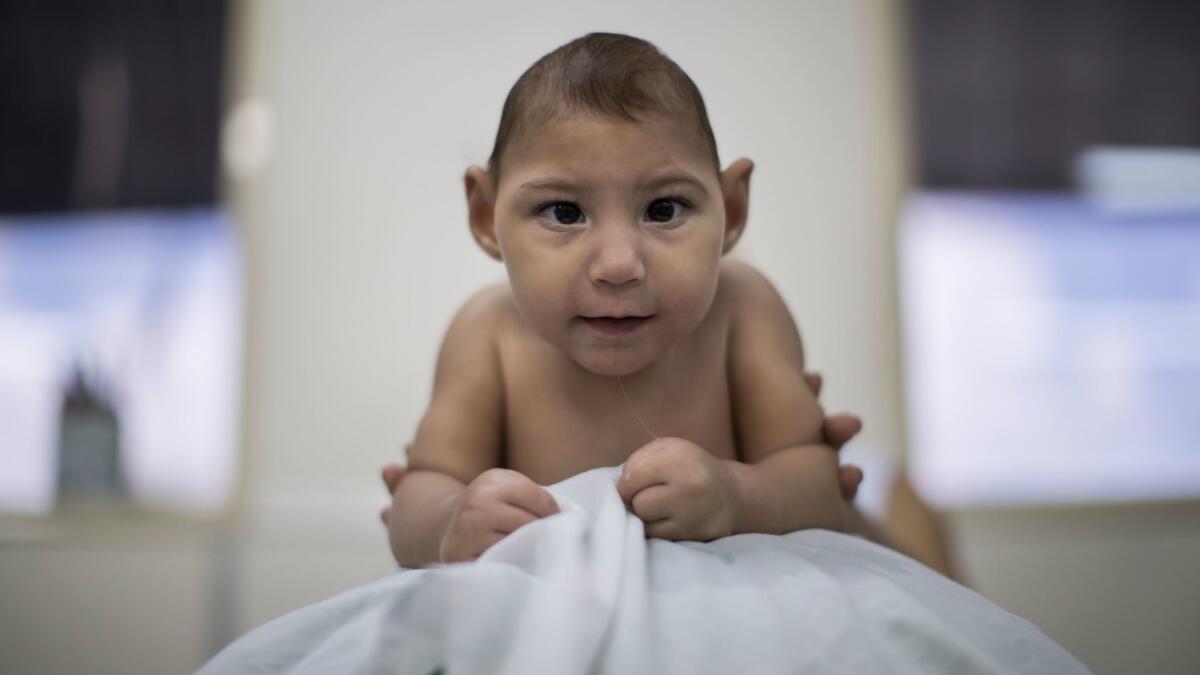Pregnant women with Zika are 20 times more likely to have a baby with a birth defect, CDC says

It’s been clear for a while now that pregnant women who become infected with the Zika virus are more likely to have babies with microcephaly, neural tube defects and other serious problems. Now experts can say just how much bigger that risk is for these babies: 20 times greater than if their mothers were Zika-free.
That finding, reported Thursday by a team of epidemiologists from the Centers for Disease Control and Prevention, answers a question that has flummoxed scientists since the Zika virus was first linked to a rash of birth defects in Brazil in the summer of 2015.
The first step in calculating that number was to determine the baseline risk for the kinds of birth defects seen among pregnant women infected by Zika, including potentially fatal abnormalities of the brain or central nervous system, neural tube defects and eye abnormalities.
Defects such as these can be caused by other kinds of infections, nutritional deficits or genetic abnormalities, and physicians have seen them for as long as they have been taking care of pregnant women and their babies. Without a clear picture of just how common such birth defects are in a population of pregnant women unaffected by Zika, scientists could have no way of knowing how potent a driver of birth defects the Zika virus truly is.
This is where the painstaking collection, maintenance and analysis of health “outcomes” — what public health officials call surveillance — pays its dividends.
So the CDC researchers drew from their own intelligence-gathering efforts on birth defects before the Zika virus even appeared in Brazil. Epidemiologists examined birth outcomes in North Carolina, Massachusetts and three counties surrounding Atlanta in 2013 and 2014. They carefully teased out the numbers and details of babies born there, including miscarriages and those who were stillborn.
In those areas, and during a period that predated the arrival of Zika in the Americas by more than a year, the researchers tallied 747 infants and fetuses with one or more of the abnormalities that have since become the hallmarks of Zika infection. Of those, 154 fetuses were “pregnancy losses,” most often doomed by a brain abnormality or neural tube defect.
Altogether, fetuses and babies with such defects represented just 2.86 per 1,000 live births to women in those surveillance areas in 2013 and 2014.
The epidemiologists then compared that number to the prevalence of birth defects seen in babies and fetuses who were born in 2016 to women who contracted Zika while they were pregnant. These women were closely tracked after their infections were clearly confirmed by blood tests.
That group of 442 pregnant women gave birth to 26 infants and fetuses with these same birth defects. This proportion — 58.8 per 1,000 — is approximately 20 times higher than in the baseline group that was Zika-free.
The upshot: For a pregnant woman outside of areas where mosquitoes are spreading the Zika virus, the risk of having (or losing) a baby with a defect such as microcephaly, neural tube defect, or brain or eye abnormality is pretty low, well under 1%.
But for a pregnant woman infected with Zika, that risk escalates by a factor of 20. She has a roughly 5.9% chance that her baby will miscarry or be born with one of the serious abnormalities linked to Zika.
The report appeared in the CDC’s Morbidity and Mortality Weekly Report.
For a list of CDC’s travel advisories and some general advice to pregnant women about Zika, see here.
Twitter: @LATMelissaHealy
ALSO:
Colorectal cancer rates are rising among younger Americans even as they’re falling for others
Are restrictions on the ‘abortion pill’ politics or science?
How plants can provide clues about the spread of ancient civilizations




